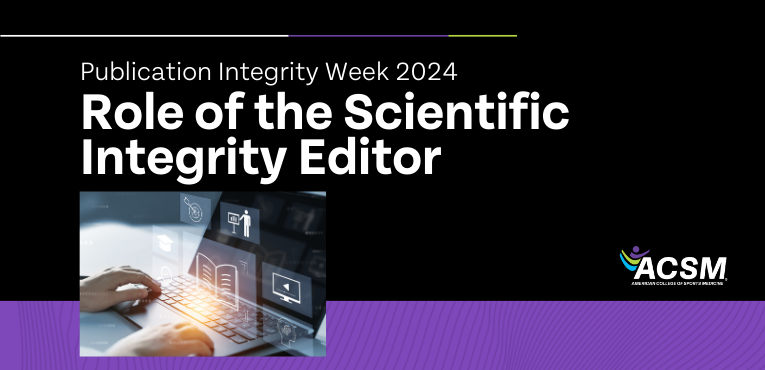Jeffrey Potteiger, PhD, FACSM |
Nov.
19, 2024

The role of a journal editor and editorial board is critical to maintaining the integrity, reliability, and ethical standards of the scientific literature that is published. To that extent, an editorial board member who has a sole focus on scientific integrity provides valuable perspective and support to the publication process. Provided below are reasons why an associate editor for scientific integrity is a necessary component of any editorial board.
Editors and editorial boards are responsible for upholding the quality of the journal's content. Collectively, they ensure that published research is of high scientific merit, that methodologies are based on sound research principles, and that conclusions are valid and supported by the data provided. This helps prevent the publication of flawed or misleading research that could undermine trust in the field. They oversee the peer review process, ensuring that the research is thoroughly evaluated by experts in the field, identifies errors, biases, or misinterpretations that the authors may have overlooked.
Editors and the editorial board are also responsible for detecting and preventing plagiarism, self-plagiarism, or other forms of research misconduct. This includes ensuring proper citation practices and the originality of submitted work. Editors must ensure that authors, reviewers, and themselves disclose any potential conflicts of interest that could affect the objectivity of the research or the review process. By managing these disclosures, editors reduce the risk of bias in published research. Editors help enforce transparency regarding data availability, and they may require authors to share data or methods, particularly in cases of contentious or high-impact studies. This contributes to reproducibility and accountability in science.
One of the most important roles of scientific integrity editor is to guard against fraudulent research, such as fabricated data or manipulated results. If such studies are published without scrutiny, they can mislead other researchers and policymakers, potentially harming society. By rigorously evaluating submissions and addressing allegations of misconduct, scientific editors help ensure the integrity of the scientific record. If errors or ethical concerns are found after publication, scientific integrity editors are responsible for working with the editor in chief to take corrective actions, such as issuing retractions, corrections, or clarifications. This demonstrates a commitment to transparency and scientific accountability.
Scientific integrity is closely tied to the reproducibility of results. The review process ensures that research is published in a way that allows others to replicate the study. This involves encouraging authors to provide clear methodologies, data, and supplementary materials. The integrity of the scientific method rests on the ability of other researchers to verify and replicate results. A journal's reputation is built on its commitment to ethical standards and scientific rigor. By overseeing a thorough and unbiased editorial process, scientific integrity editors help ensure that the journal maintains its status as a trusted source of knowledge. The integrity of the journal contributes directly to the integrity of the broader scientific community.
In summary, editors and editorial boards, along with the science integrity editor play an essential role in preserving the trustworthiness of scientific research by ensuring that it meets rigorous standards of accuracy, ethical behavior, transparency, and reproducibility. Their vigilance in upholding scientific integrity not only benefits the journal and the research community but also safeguards the public interest by ensuring that science remains a reliable source of knowledge.
ChatGPT was used in the writing of this blog post. The following prompt was used to develop the content of the post: “Importance of a science integrity editor”.
Jeffrey Potteiger, PhD, FACSM, serves as interim dean of the College of Health Professions at Grand Valley State University. He has served a number of roles supporting ACSM publications, including book author, on the editorial boards for several journals, as well as past chair of the ACSM Publications Committee. Dr. Potteiger currently serves as the Scientific Integrity Editor on the editorial board of Medicine & Science in Sports & Exercise®.